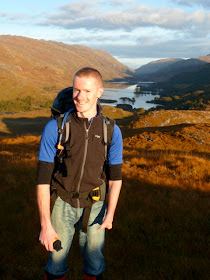I’ve had two and a half intense days at home since returning from work in Milton Keynes and leaving for more work in Wales this morning. Too much driving!
Last night, after a marathon office stint, attempting to finally catch up with all my work at home, I enjoyed a session on my board immensely. That might not seem surprising. But to me, the extent of my enjoyment of bouldering surprises me nearly every time I do it.
As I was saying in a recent post, I’m looking for lots of things in climbing - adventure, partnerships, big challenges. Seen as ‘higher order’ pleasures compared to the physical enjoyment of climbing. Except ‘higher order’ is totally the wrong way to see it.
In actual fact, there is nothing ‘lower order’ about the physical side of climbing. Firstly, because there’s no such thing as a purely physical pleasure. All enjoyment is psychological. Sometimes it’s convenient to separate ‘basic physical’ and more complicated feelings. However, when it comes down to it, there is no difference along these lines and that is not sufficiently recognised in modern discussions of climbing or other types of enjoyment.
A complicating factor in how physical and mental pleasures have become separate is our natural tendency to become either arrogant, ignorant or just a bit unimaginative. Lots of climbers got into climbing to have adventures, see nice places, gain respect or acceptance and other things like this. It’s still fairly common that some climbers either simply don’t understand sport climbing and bouldering, or think they do understand it and look down upon it as a ‘lower order’ pleasure.
Their loss! And I don’t mean that in a dismissive way. This post is a direct appeal to those people to make another effort to understand it and realise the whole world of deep enjoyment they are missing out on!
Sometimes, it’s purely the fear of the status quo changing and their connection with climbing changing that stops people giving it any effort. Maybe your view of what you value in your climbing might change forever and that feels risky. But much more often it’s a purely practical problem - people don’t know how to boulder. They don’t know what to do on a bouldering wall. It feels boring to them. Their mistake is to deduce therefore it is boring. Rather, they just haven’t figured it out yet.
It’s a skill in itself and it takes time and application to master. It’s not love at first acquaintance for everyone as I’m sure some of you could testify. Think about a skill you know well such as your favourite branch of climbing, your job or some other activity. Have you ever seen people make some basic mistakes and fail to connect with it? You find yourself thinking “if you just did it this way, you’d get so much more out of it!”. Well maybe you are in the same position with bouldering.
I’ll put my money where my mouth is and write a simple guide to how to boulder and enjoy it for those who have tried and don’t. I’ll do this shortly and post on my other blog. But for now here is a quick thought:
We call boulder problems ‘problems’ because it is primarily a problem solving activity (that idea of it being all about the physical is dissolving already!). So you have to come to it with the willingness to grapple with the problem - experiment, learn incrementally and then reach the solution. If you do it indoors then you inevitably run out of problems and need to set more yourself. So it’s also a problem setting discipline. A massive area of skill with lots of areas to go wrong. Learn it piece by piece.
And what about the physical connection? First, you have to open yourself to the pleasure of movement. Not everyone is. They are too focused on getting to the top - the result, the task completion mentality. There is more to it. If the objective is not just to climb it but to climb it well, with minimum force. The experience has more dimensions this way. The application of strength and momentum is enjoyable too. But not just for the force - for the timing of the force and also the sparing of it.
It’s possible to get so much enjoyment from an hour on a plywood board. Crazy thought.







































